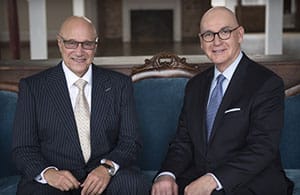Wrongful Convictions: Questions & Answers
Our attorney, Paul F. Callan, has extensive experience in reversing wrongful convictions. Below he answers some questions about his involvement with the famous Central Park Five case and subsequent exonerations.
In 2013, Donald Trump tweeted that the documentary, the Central Park Five, was a “one-sided piece of garbage.” What is your response to this statement?
Callan: The statement made by Mr. Trump is wrong and obviously based upon his ignorance concerning the true facts of the case. I had an opportunity to conduct a detailed review of all the available evidence regarding the Central Park Five prosecution. My access to important case documents occurred when I represented the two Manhattan assistant district attorneys who conducted the reinvestigation of the Central Park Jogger Case. Their comprehensive reinvestigation ultimately led to the dismissal of all charges against the Five. The two were critical non-party witnesses in the Central Park Five civil litigation.
Should taxpayers be required to foot the bill for wrongful convictions?
Callan: It is fair and just for taxpayers to fund judgments and settlements in wrongful conviction cases. Often this is the only compensation source available for those who suffered the tragedy of wrongful conviction. These convictions were obtained in taxpayer-funded courts on evidence often gathered and/or presented by taxpayer-funded law enforcement personnel such as police and prosecutors. Other non-governmental parties who contributed to the wrongful convictions can be brought into such lawsuits using impleader actions in most cases if required.
How is compensation determined for wrongful conviction cases in New York?
Callan: Judges and juries calculate damages by assessing such things as lost wages, medical or psychiatric expenses, and any damages due to pain and suffering, emotional distress, or damage to the reputation of the wrongfully convicted individual.
What was the key piece of evidence that revealed Jonathan Fleming was wrongfully convicted?
Callan: The key piece of evidence leading to Jonathan Fleming’s exoneration was a hotel receipt proving that Jonathan was in Florida at the time of the Brooklyn murder for which he was unjustly convicted. We were prepared to prove at trial that Jonathan gave the receipt to the police at the time of his arrest telling a police detective that it proved his innocence. When demanded by Jonathan’s defense attorney before and during his trial, prosecutors failed to turn over the receipt and other evidence to the defense in violation of the Brady Doctrine. Brady v. Maryland, 373 U.S. 83 (1963) Twenty-four years later the receipt was found in law enforcement files causing prosecutors under the direction of then Brooklyn District Attorney Kenneth Thompson to join in the defense motion for a dismissal. We then filed civil lawsuits against both the City of New York and New York State on Jonathan’s behalf. After over 24 years in prison for a crime he did not commit, Jonathan was finally compensated by New York City and the State of New York in the total amount of $9,650,000.
What role did the media play in Jonathan Fleming’s case and wrongful conviction cases as a whole?
Callan: Media coverage of wrongful conviction cases has substantially increased public awareness of the plight of so many wrongfully convicted individuals and the need for reform in this area of the law. Media coverage was particularly helpful in Jonathan’s case. It brought the facts of his case to the attention of the public and the Comptroller of the City of New York, Scott Stringer, who responded to our early settlement demands. After many conferences and a comprehensive presentation of the evidence, the City of New York settled the case for $6,250,000. After protracted litigation, the State of New York then settled for $3,400,000 bringing the settlement total to $9,600,000.
Throughout the years, many have stated that police and prosecutors lack accountability in wrongful conviction cases. Do you agree with this and how so?
Callan: I agree that there are substantial reforms which are urgently required to hold law enforcement officials accountable for abuses which often lead to wrongful convictions. The most important would be the amendment of state and federal “qualified immunity” laws which often provide immunity to law enforcement officials who intentionally violate the rights of the accused to get convictions.














